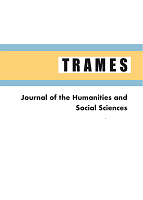CLASS CAPITALISM IN A POST-LIBERATION STATE: DEMOCRATIC SOUTH AFRICA’S BLACK DIAMONDS
CLASS CAPITALISM IN A POST-LIBERATION STATE: DEMOCRATIC SOUTH AFRICA’S BLACK DIAMONDS
Author(s): Juliet JosephSubject(s): Gender Studies, National Economy, Economic history, Political history, Social history, Political economy, Politics and society, Social Theory, Sociology of Politics, Socio-Economic Research
Published by: Teaduste Akadeemia Kirjastus
Keywords: class capitalism; elitism; intersectionality; privilege; politics; elitism; South Africa; patronage politics;
Summary/Abstract: Through its legislation fixed in its Constitution, South Africa has made great strides towards inclusion and equality for the marginalised. However, the gap between the rich and the poor has continued to widen. Elitism and privilege are as old as human existence and will continue in the future. This study will examine the political climate of class capitalism as a threat to human security. This article examines the impact of neo-liberal policy reform aimed at ensuring transformation and development, through an exploration of South Africa’s Broad Based Black Economic Empowerment (BBBEE) policies. Through its conceptual framework, intersectional theory explores hierarchy dominated by intersectional challenges that are connected to race, class, and gender and remain tied to power and privilege. Based on the findings of the study, South Africa’s post-liberation period instilled class divides that reinforced systems, processes and legacies of the past that still dominate the state and its people. Further, the study questions whether affluence and elitist politics create unequal distributions of resources, which contribute to human security threats within the region, including mass poverty, which impacts the lives of the vast majority of South Africans. There are clear winners and losers in South Africa as a result of capitalism and nationalistic discourses. It is confirmed in representations and categories across races, classes, and genders that exist in South Africa’s emerging class capitalism. In this paper, an intersectional study suggests that black African females remain highly stereotyped within hegemony, hierarchy, class, and social representations.
Journal: TRAMES
- Issue Year: XXVII/2023
- Issue No: 1
- Page Range: 67-88
- Page Count: 22
- Language: English

